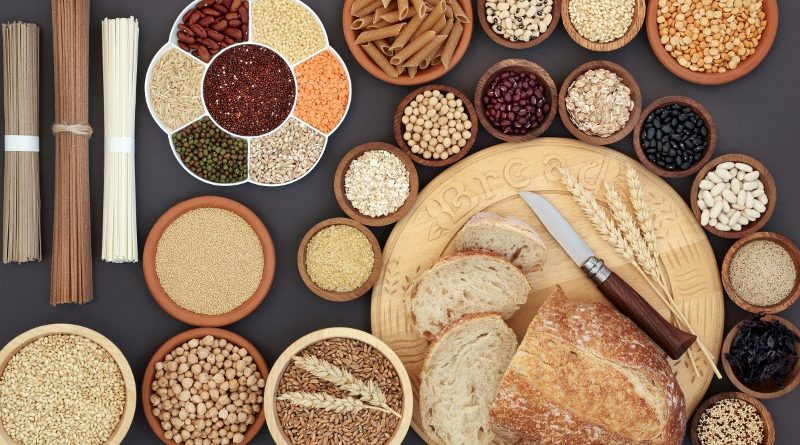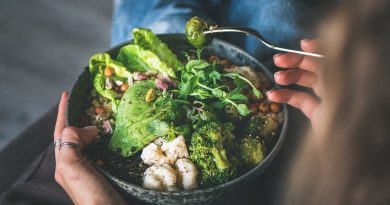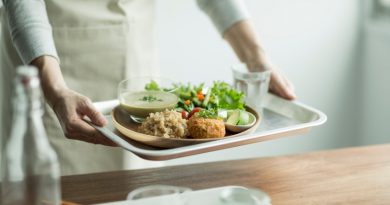Dietary Protection from Coronavirus
By Alex Jack, Bettina Zumdick, and Edward Esko
As the world mobilizes to contain the coronavirus pandemic, a fundamental dimension of the crisis remains largely unrecognized: diet and environment. Global warming and climate change are major factors in the spread of infectious disease. In South America, herbicides introduced into the pampas altered the ecology, leading to the creation of a new mouse that was the carrier of a deadly virus that produced Argentine hemorrhagic fever, a disease similar to Ebola.
In Africa, AIDS, Ebola, and other deadly new viral diseases emerged in areas characterized by banana plantations and other monocultures, the extraction of conflict metals, and uranium mining—all of which involve chemicals and toxins that can disrupt ecosystems and give rise to virulent new strains of viruses.
The worldwide decline of songbirds and frogs, to take another example, is leading to the catastrophic increase in mosquitoes, fleas, and other insects that spread viral and bacterial diseases. Global warming, the thinning of the protective ozone layer around the earth, and other environmental changes are key factors in the decline of biodiversity and rise of new diseases.
The origin and vector of COVID-19 in China remains uncertain. The toxins leading to the virulent new strain of coronavirus could be agricultural or connected with the manufacture of smartphones, plastic toys, or any number of other products. To prevent future epidemics from spreading from the soil to animal carriers and then to humans, it is imperative to transition to a natural and organic agriculture and food system.
Similarly, to prevent or treat corona and other viral diseases, it is important to maintain strong healthy blood, lymph, and other body fluids. These are the body’s primary line of defense against contagious diseases and immune deficiency disorders. Along with known risk factors such as age, sex, and exposure to the microbe, they help determine whether any given individual will symptomatize and the mildness or severity of their infection.
The best way to build up natural immunity to contagious disease is to eat a strong, balanced, mineral rich diet, beginning with whole cereal grains, beans and bean products, miso soup; leafy green, round, and root vegetables; arame, wakame, nori, or other sea vegetables; home-made pickles or sauerkraut; fruit, seeds, nuts, mild grain-based sweeteners, spring or well water, and nonaromatic, nonstimulant beverages.
On the minus side of the dietary ledger, natural resistance to infection is compromised by eating animal-quality foods (with the exception of small amounts of white-meat fish), polished grains, cane sugar and other simple sugars, coffee and other stimulants, hot spices, alcohol, and foods grown with or containing chemicals, preservatives, and GMOs. Ultra-processed foods, which now make up about half the modern diet, should also be strictly avoided, including both the red-meat Big Mac and the vegan Impossible Burger.
We support the current worldwide mobilization to stem the coronavirus epidemic, including proper hygiene, quarantine, and development of a safe, effective vaccine. In our experience as dietary and way of life counselors dealing with patients with AIDS and other viral conditions over the years, we have found that Ume-Sho-Kuzu Drink to be highly beneficial for strengthening digestion, reducing inflammation, relieving infection, and helping the body discharge acidity. Miso soup, a traditional soup made with fermented soybean paste, wakame sea vegetables, and several seasonal vegetables, is also protective.
Ume-Sho-Kuzu Drink
- Dissolve 1 heaping teaspoon of kuzu in 2-3 teaspoons of cold water.
- Add 1 cup of cold water to the dissolved kuzu.
- Bring to a boil over a medium flame, stirring constantly to avoid lumping, until the liquid becomes translucent. Reduce the flame to low.
- Add the pulp of ½ to 1 umeboshi plum.
- Add several drops to 1 teaspoon of shoyu/natural soy sauce and stir gently.
- Simmer for 2-3 minutes. Drink hot.
Ume refers to umeboshi plum; sho to shoyu or natural soy sauce, and kuzu to kuzu (kudzu) root thickener. If kuzu is not available in the natural foods store or supermarket, use kukicha (bancha twig tea). If this is not available, just use water.
The three ingredients in this traditional home remedy have been found to be beneficial to help relieve other potentially lethal viral conditions, as well as other serious disorders:
- Japanese medical researchers found that umeboshi contains a substance that can suppress the growth of the H1N1 virus that sparked the Swine Flu epidemic. When applied to affected cells, scientists reported, the growth of the virus was suppressed by nearly 90% after seven hours.
- Kuzu, the creeping vine known as kudzu in the West, is a potent suppressor of HIV-1 cells, according to the journal Retrovirology. “Specifically, kudzu inhibits the initial attachment of the viral particle to the cell surface,” the researchers reported. More than 90% inhibition was observed in the experiments. “Given kudzu’s low cost, safety, oral bioavailability, tissue distribution, activity with ART [anti-retrovial therapy] and potent activity against HIV…it should be considered as a promising supplement to current HIV therapeutic strategies.”
- The British Medical Journal reported early this this that miso and natto, fermented soy products originally from the Far East that are now produced in Europe, America, and other modern societies, were inversely associated with all causes of mortality, including respiratory diseases, in both sexes.
- Scientists at the National University of Singapore report that shoyu has antioxidant properties that are 10 times more potent than red wine, and 150 times more effective than vitamin C. It’s the high concentration of brown pigment in shoyu that is thought to contribute to its strong antioxidant and anticancer properties. Shoyu aids in digestion and is rich in minerals.
Miso Soup
- 2-inch piece of dried wakame sea vegetable
- 1 cup onions, sliced thinly
- 1 quart water
- barley miso
Soak the wakame (about ¼-½-inch piece per person) for 5 minutes and cut into small pieces. Add the wakame to fresh, cold water and bring to a boil. Meanwhile, cut onions into small pieces. Add the vegetables to the boiling broth and boil all together for 3-5 minutes until the vegetables are soft and edible. Reduce flame to low. Dilute miso (½ to 1 level teaspoon per cup of broth) in a little water, add to soup, and simmer for 3-4 minutes on a low flame. Once the miso is added, don’t boil the soup. Just let it simmer. Garnish with finely chopped scallions or parsley before serving.
- Be sure to simmer the soup for 3-4 minutes after miso paste is added to the broth. This is a very simple soup to make, but not letting the miso cook properly will reduce its effects
- For variety or a gluten-free miso, use brown rice miso or all soybean (hatcho). As a rule, misos for daily soup should be aged a minimum of 2 years. Misos may also be combined for a unique taste and flavor. Lighter red, yellow, and white misos make great dressings and sauces
- Vary the vegetables daily. Nice combinations include onions and tofu; onions and sweet autumn or winter squash; cabbage and carrots; and daikon and daikon greens
- Include leafy greens often in miso soup, including kale, collards, watercress, etc. Add them toward the end of cooking since they don’t need to cook as long
- A small volume of shiitake mushrooms (soaked and finely chopped beforehand) may be added and cooked with the other vegetables from time to time
- For the most beneficial effect, miso soup should be cooked fresh each time and not stored overnight
Miso is well known for preventing cancer, heart disease, radiation sickness, and other chronic conditions and disorders. It is also effective to neutralize microbial afflictions:
- The International Journal of Medical Sciences reports that miso extracts are effective to “work as antivirals” against Hepatitis A Virus.
Several years ago, when the Ebola epidemic broke out in West Africa, we launched a web site with dietary advice for Ebola: www.ebolaanddiet.com. These guidelines were circulated widely, and we received a note of thanks from a major international airline with routes between West Africa and Europe and America that distributed the suggestions to their very alarmed staff and pilots.
Dr. David W. Denning, Professor of Infectious Diseases in Global Health, University Hospital of South Manchester, UK, endorsed these recommendations: “Sensible and nutritious dietary advice and real behavior change is needed across the Western world. Red meat eating … contributes big time to water shortages and global warming as meat is an inefficient source of protein compared with fruit and vegetables … I suspect that even 2 days of macrobiotic food would be a great improvement on many people’s diets … There is much your advocacy can offer the world.”
There are many healthful foods and safe, effective remedies that can promote natural immunity and, as part of an integrative medical campaign, help relieve the spreading coronavirus pandemic. Please see your physician if you suspect you have corona and visit our website: www.planetaryhealth.com for further information.
The coronavirus crisis offers an opportunity for integrative medicine, combining the best allopathic and holistic approaches, to help resolve a global health emergency. If the focus remains only on suppressing the virus and eliminating its vectors, it may serve to intensify xenophobia, prejudice, and other polarizing tendencies. As a society, we must self-reflect and take responsibility for creating deadly epidemics through destructive agricultural, industrial, and environmental policies. By uniting together and reorienting in a more natural, organic, and sustainable direction, there is an excellent chance we can stem the contagion and make future outbreaks more unlikely.
Alex Jack is director of Planetary Health, Inc. and author or co-author with educator Michio Kushi of The Cancer-Prevention Diet, AIDS & Beyond: Dietary and Lifestyle Guidelines for New Viral and Bacterial Epidemics, and other books on diet, health, and the environment. Bettina Zumdick is founder and director of the Culinary Medicine School, culinary arts director of Planetary Health, and author of Authentic Foods and other books. Edward Esko is director of the International Macrobiotic Institute, vice president of Planetary Health, and author of Alzheimer’s: The Macrobiotic Approach and other books.






